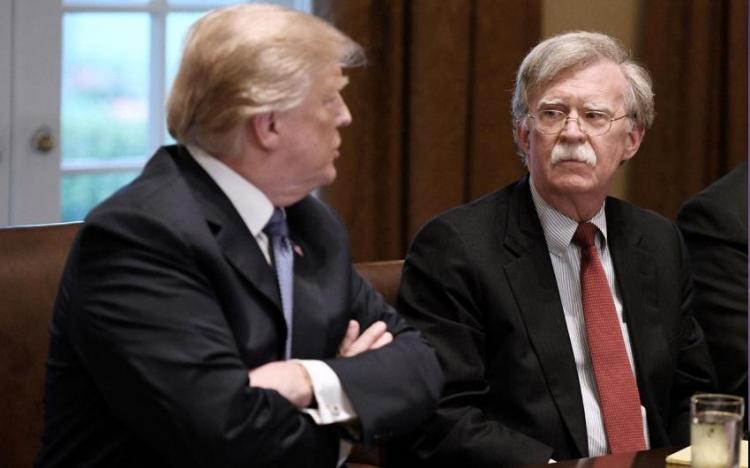Bolton"s dismissal will impact the Syrian issue, relations with Turkey – Scholar
Washington DC – North-Press Agency
Edmund Ghareeb, a professor of international relations at Georgetown University in Washington DC has told North-Press: “The resignation of the U.S. national security adviser John Bolton, will affect the Syrian, Iranian, Gulf and Palestinian issues, as there is a contradiction between the U.S. President Donald Trump and Bolton.
Prof. Ghareeb stressed that the departure of John Bolton will absolutely affect the Syrian issue, but this would not witness any radical changes at all if there were tougher stances than the rest of the U.S. administrations.
He pointed out that there are several key issues, including the relation with Turkey, the U.S. vision of the Iranian role in Syria and the relationship between the two parties, in addition to the so-called Beirut-Damascus-Baghdad-Tehran group with regard to Israel and the Israeli security, which are decided by the president and senior officials, especially those specialized in the military, diplomatic, economic and security affairs.
Ghareeb argues that there are no significant differences between Bolton and the group of decision making regarding Syria in the United States, and he predicts to see stronger voices for some people who support improving the relationship with Turkey.
He said that there were several reasons for Bolton’s dismissal, the most prominent one is that John Bolton’s ideas and the way he was doing his job in the White House are not in line with the president’s agenda and goals, in addition to the difference of priorities between Bolton and Trump.
“John Bolton has a strict policy, sometimes supporting the use of military force, and even the idea of changing regimes in some countries, which Washington considers as hostile”, prof. Ghareeb said.
The professor cites several examples of Bolton’s strict policy, including the idea of military intervention in Iran after the U.S. drone was shot down, and a decision by Bolton before President Trump had decided to stop the operation about half an hour prior its beginning.
The disagreement between President Trump and Bolton is summarized by Bolton’s support for the military intervention, while Trump supporting the use of severe economic sanctions on Iran, aiming at pushing Iran to change its policies and bring it to the negotiating table, according to prof. Ghareeb.
President Trump was prepared to offer Iran a financial deal or a financial credit line at the G7 summit, as he was willing to sit at the negotiating table without preconditions, while Ghareeb strongly asserts that the Iranians are seeking gains related to the removal of the sanctions and the ability to sell oil.
“Bolton’s dismissal will facilitate negotiations between Washington and Tehran, as there have been statements by President Trump expressing his openness for dialogue with Iran without any conditions”, he added.
He continued: “But this dismissal would affect the Gulf countries and Palestine, because Bolton was supporting the method of regime change on a principled basis, and he believed that method was the better one, in addition to his desire to support the U.S. allies and their agendas”.
“Furthermore, the negotiations with North Korea, which he believed that things might made some progress”, prof. Ghareeb said.
“Another factor that contributed to Bolton’s dismissal was the dispute over negotiations with the Taliban and their invitation for meeting with the leaders of the Afghan government at Camp David which was eventually canceled”, he added.
John Bolton focused on the most comprehensive solution to reach, which led to the failure of negotiations and the decline of relations between the two countries, in addition to Bolton’s role in Venezuela, and his engagement with military leaders in order to change the regime in Venezuela, which reflected a real lack of understanding for what is going on there as well as to its failure.
According to prof. Ghrareeb, another reason for Bolton’s dismissal was the disagreements regarding the mission of the national security council adviser, which is to coordinate and communicate with all the major forces within the U.S. administration and to listen to their opinions and submit their proposals, in addition to the possibility of submitting proposals by him in order to give the president and the U.S. administration different options about the best policies that can serve the American interests.
Prof. Ghareeb concluded that Bolton’s failure was likely ineffective, but he was often pushing for adopting his agenda, policy and his vision of how to deal with various periodic events.

